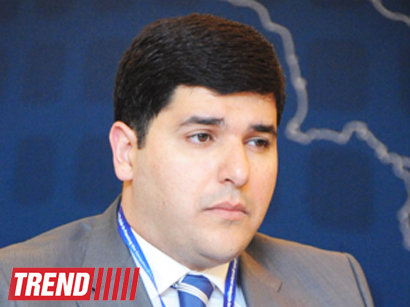Azerbaijan, Baku, Sept. 3 /Trend E. Mehtiev/
Azerbaijan, basing on the international law, has proved that it borders were violently changed by Armenia, which is reflected in the resolutions of many international organizations, the head of the Center for Strategic Studies Center (CSS) under the President of Azerbaijan Farhad Mammadov said on Tuesday.
He made the remarks during the panel discussion on 'Protracted conflicts in South Caucasus: ways out of the difficult problem' organized at Azerbaijan Diplomatic Academy within the framework of the second forum 'South Caucasus in a changing world', of the Association of Scientists for International Relations, which continues in Baku.
According to Mammadov, despite the adoption of these resolutions, unfortunately they are still not fulfilled, which concerns Azerbaijan.
"We are witnessing adoption of double standards. The UN resolutions on the liberation of occupied Azerbaijani territories have not been fulfilled for 20 years, but other resolutions are fulfilled in a few hours. Azerbaijan is concerned about the fact that Armenia remains unpunished," Mammadov said.
If an aggressor state is not punished by the international community, then Azerbaijan, using the existing opportunities should punish Armenia, CCS head said.
"Azerbaijan is strengthening its military budget, because it is obliged to do so. There is no another method of punishment. And even if there is one, it must be applied against Armenia," Mammadov said.
Armenia managed to somewhat develop its economy through the money of diaspora and other resources, the CSS head said.
"But after the global crisis, Armenia still can not reach the indicators of 2008. Armenia's population is decreasing, but GDP per capita remains unchanged. But in Azerbaijan the growth of population is accompanied by the increase of gross domestic product," Mammadov said.
"Today Azerbaijan is building its future, implements major prospective projects," CSS head said.
During his speech, the CCS head also touched upon the activity of the OSCE Minsk Group, noting in particular that the talks conducted by the Minsk Group are ineffective.
"The co-chair countries of the Minsk Group are the strongest countries in the world. Azerbaijan was hoping that these countries, declaring Armenia as an aggressor, will withdraw its armed forces from Azerbaijan's occupied territories. Much to our regret, we see that it was not possible," the CSS head said.
Azerbaijan does not give up OSCE Minsk Group format, because without Azerbaijan's consent no decision can be taken, Mammadov said.
"The Minsk Group format creates conditions for Azerbaijan to demonstrate its position within these frameworks," CSS head said.
If Armenia is thinking about its future, then it should very constructively approach to this conflict and ensure the withdrawal of occupation forces from Azerbaijani lands, Mammadov said.
The conflict between the two South Caucasus countries began in 1988 when Armenia made territorial claims against Azerbaijan.
Armenian armed forces have occupied 20 per cent of Azerbaijan since 1992, including the Nagorno-Karabakh region and seven surrounding districts.
Azerbaijan and Armenia signed a ceasefire agreement in 1994. The co-chairs of the OSCE Minsk Group, Russia, France and the U.S. are currently holding peace negotiations.
Armenia has not yet implemented the U.N. Security Council's four resolutions on the liberation of the Nagorno-Karabakh and the surrounding regions.






